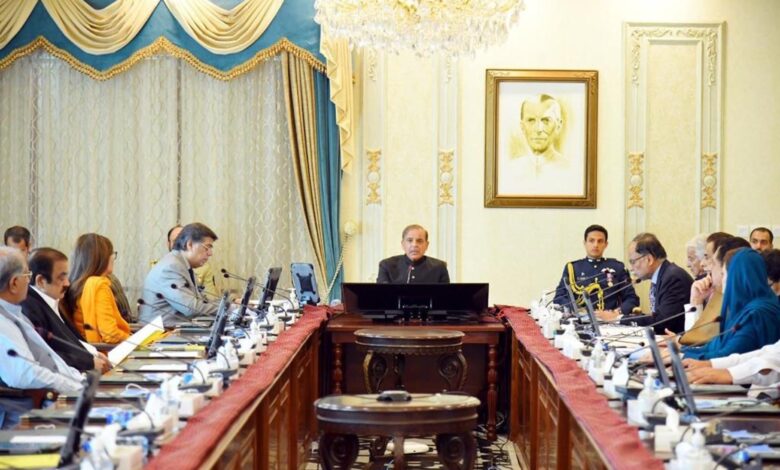
Usman Danish
The federal cabinet's daring act to reject the decision of the Supreme Court regarding holding elections in Punjab on May 14, calling it unworkable, has caused a heated debate with some legal experts calling it an act of contempt of court.
A three-member bench of the Supreme Court, headed by the Chief Justice of Pakistan, has annulled the decision of the Election Commission to hold the elections on October 8 in the case related to the postponement of the Punjab and Khyber Pakhtunkhwa elections and has ordered that the elections in Punjab should be held on May 14.
Regarding Khyber Pakhtunkhwa, the Supreme Court has declared that after looking at the situation in KP, a decision will be taken at an appropriate forum.
After the decision of the Supreme Court, a meeting of the federal cabinet was called wherein the cabinet rejected the decision of the Supreme Court.
After the meeting, PML-N Senior Vice President Maryam Nawaz said, in a tweet, that the Federal Cabinet's rejection of the Supreme Court decision was also inadequate. Maryam Nawaz said those who mock the constitution and the law and impose their ‘blue-eyed boy’ should be brought to justice.
The legal experts, however, have a consensus over the consequences of the Federal Cabinet's move to reject the Supreme Court's decision.
Barrister Gauhar Khan, a legal expert, said that the move of the federal cabinet is regrettable, adding that the Cabinet cannot reject the decision of the Supreme Court.
He said if the government does not conduct elections on the orders of the Supreme Court, the SC will constitute a Supreme Bench to implement its decision, and contempt of court proceedings may also be commenced against it.
Babar Khan Yousafzai, a Supreme Court lawyer, also said that disobeying court orders is an act that amounts to contempt of court, adding that the separation of power has been clarified in the 18th Amendment.
He said the order of the Supreme Court is a judicial order and it binds the government to obey the court order. The government does not even have the right to appeal against this decision of the Supreme Court.
Yousafzai said that the government may apply for a review of the judgment, and can file a petition in the Supreme Court requesting the constitution of a larger bench.
He said that it would have been better if the Chief Justice had formed a bench in consultation with all the judges, and included senior judges, then even the government would not have objected.
Yousafzai said, “I don't understand why the Supreme Court has given the date of May 14 for the election in Punjab but not the date of an election in Khyber Pakhtunkhwa.”
He said it was a suo moto notice case and it was related to the postponement of elections in both provinces but the date of the election in Khyber Pakhtunkhwa was not given which is surprising.
Pakistan Tehreek-e-Insaf Khyber Pakhtunkhwa spokesperson Shaukat Yousafzai said they will approach the Supreme Court for the elections in Khyber Pakhtunkhwa as the governor of Khyber Pakhtunkhwa first gave the date of May 28 and then changed it to October 8 without giving any reason.
We are in touch with legal experts in this regard and will file a petition in the Supreme Court tomorrow in which we will request the court to give the date of elections in Khyber Pakhtunkhwa as well as in Punjab, he furthered.
Waseem Ahmad Shah, a Peshawar-based senior journalist who has a close eye on political and judicial affairs, said that the situation in Pakistan today is not new, saying that there were similar situations in 1997 too when differences between the judges came to the fore.
He said, now the three-member bench of the Supreme Court has ordered the election, then the responsibility of the Election Commission is to conduct the elections in any case, "But then there is the same question that if the government, who will provide the resources for the elections, says that it cannot provide security and there is no fund, then it will be difficult for the Election Commission to conduct the elections."
He said the Federal Cabinet's rejection of the Supreme Court's decision will be a separate issue, further stating that if the government does not conduct the election by violating the order of the Supreme Court, then the Supreme Court can summon the Prime Minister in contempt of court and may take action against him.
We already have such an example when former Prime Minister Yusuf Raza Gilani disobeyed court orders and was disqualified by the Supreme Court in 2012, he added.
The senior journalist said that now is the time for the political parties to come forward and find a solution to this problem, “If it wasn’t sorted out, then the non-democratic forces would get a chance, as has happened many times in the past.”